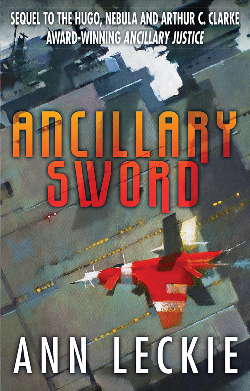
What happens when you concatenate something that had taken place over thousands of years across a galaxy into a short hop through a space gate and a visitation to a space station and a planet which practices slavery in all but name? You have Ancillary Sword, the compact second instalment of the Imperial Radch trilogy. Now Ann Leckie is wasting no time, and she's straight to business: one way or another, the Radch must go.
Almost immediately after the events of Ancillary Justice, ship-turned-humanoid Breq is given command of Mercy of Kalr, a Mercy class ship with a crew conditioned to act as ancillaries. With Seivarden as one of her ranking crew members and "baby lieutenant†Tisarwat on board, Breq sets a course for Athoek Station, where the sister of an old colleague lives … only to find more sectarian intrigue and throwback colonialist politics than any of them bargained for.
Ancillary Sword carries over themes and characters from Ancillary Justice without ever feeling like more of the same, or that old situations have been ported over to new planets. Leckie has presented new cultures separate to any the reader has seen before, thus perfectly underlying her point: the homogeneity enforced by colonisation and assimilation is both futile and a lie. For simplicity's sake, science fiction often treats entire alien planets as monocultural, with a centralised government and a single language and way of thought. Ancillary Sword posits that an invading force steamrolls occupied populations into an amorphous blob, and that perhaps there are individual voices being smothered to provide the illusion of that whole.
There are multiple politics at play here and, again, the single pronoun applied to all subjects of the Radch, is the least interesting of them. Leckie paints on a canvas simultaneously broader and more specific: it is no coincidence that Ancillary Sword is set largely in the orbit of a planet designated as a tea plantation. No longer content to raise one population above another to foster resentment and distract from the truer enemy, Athoek has imported dissidents from another system to work the tea, and claims that they can raise themselves out of indentured servitude if they only had the gumption — and it's not the Radch's fault that none of these citizens have boots, let alone bootstraps. They're just "lazyâ€.
It's not exactly subtle, but it doesn't have to be. That is the beauty and the curse of science-fiction and fantasy: you can absorb the story without absorbing the ideas behind it. Ancillary Sword is a story which features a gun that can pierce any material, an orbital lake separated from the vacuum of space solely by unnervingly thin glass, space travel via dimensional pockets, and the spread of omniscient consciousness, so it rollicks regardless.
Breq continues to be a remarkable character, often considering herself "angry†when she sounds reasonable in the face of the multiple injustices that she feels compelled to correct. As the only entity bothered to understand cultural relativism across the entire empire that she has grown to loathe, she is uniquely qualified to handle the issues to hand. She is never presented as a character with a saviour complex, but someone with an unerring sense of right and wrong; this concrete certainty of purpose and intent is, admittedly, more interesting in an immovable villain, but Breq has little time for ambiguity at this point in her career.
The secret, again, is the support cast. Breq fancies herself a loner but Leckie shines when she shows how her narrator works in a unit with the formerly loathsome Seivarden and Mercy of Kalr herself. The connection with a new ship allows Leckie to reintegrate the omniscient narrative that only Ancillary Justice's flashbacks boasted, and though Mercy of Kalr is more of a feeling than a communicative character, she adds distinct textures to the book. The treatment of Tisarwat by both the character of Breq and the narrative itself is also genuinely a fascinating arc, touching on issues of identity that are only possible in a story such as this one. It is this ensemble that ultimately brings Ancillary Sword home, Leckie's character work should not be underestimated.
With heavy politicking, multiple curious and discrete locations, and a self-contained story that connects a trilogy's opening and closing acts without reading like a bridge, Ancillary Sword is a fitting follow up to Ancillary Justice. Breq is an all-time protagonist, and Leckie knows precisely who to pit her with and against to make for compelling science-fiction that provokes on philosophical and practical levels alike.

